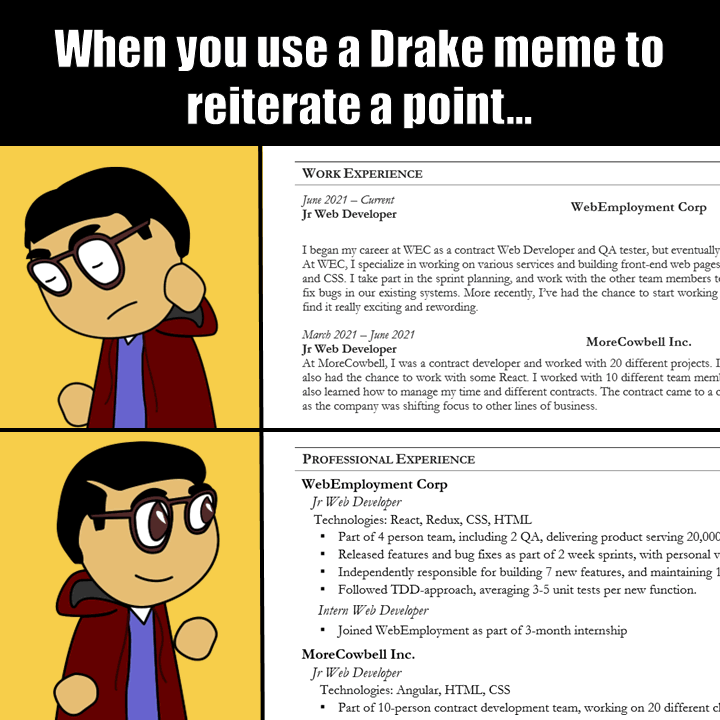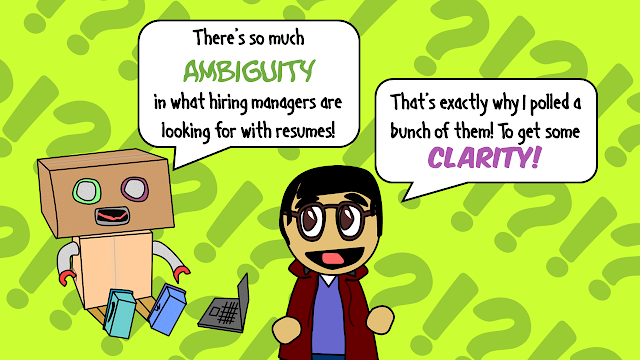
I'm a classic over-thinker. If there's an opportunity for interpretation, I will find it. I cringe when I think of the Physics 101 mid-term exam back in college, which asked about a brick falling onto someone's foot. "At the instant moment the brick contacts the foot, what is the force felt on the foot?"
Force = mass * acceleration and our professor was intentionally specific with his language because a falling brick decelerates as it makes contact and he wanted to simplify the problem.
I understood this part of the problem, but I was fixated on the word "felt." Why was our sensory system being involved? Our senses aren't instantaneous - so while the applied force of the brick to the foot is a straightforward calculation, the feeling is a whole other question.
Suffice it to say, my answer was wrong, and I shudder when I think about it. BUT it also serves as a reminder that I'm prone to over-thinking, and the only solution I have is to seek the clarity I need by asking questions, no matter how obvious they may be to others.
In our work lives we run into ambiguity a lot - especially when people are trying to be polite. Being blunt can seem rude. You'd think an over-thinker like myself would appreciate direct language but it just leaves me with more questions. I appreciate the attempts at politeness and don't mind when people say "We need to do this..." when they mean me - I just want to make sure they actually mean me.
It's lead me to preface a lot of my questions with statements like:
- "This may seem obvious but..."
- "Just so I'm clear on this..."
- "Let me repeat this back so I can be sure I have this right..."
Communication is notoriously difficult - and it's made worse with our pride, or desire to not appear naive. Not to pat myself on the back, but asking obvious questions requires bravery and confidence.
Let's consider the examples in the comic above:
"We need to get an email out to the client."
"Just to make sure, am I sending this email?"
"That would be great."
...
"Let's present our findings to the group next week."
"Ok - so, how are you thinking of this? Should I collect things in a PowerPoint and present everything?"
"I think that would be good - but, maybe before that we circulate the data so people can form their questions in advance..."
"Sure - and who should send the data? I'd be happy to..."
"Well...given the audience, I would be the one, but... that's a good point. Let's have you send the email so you can get more visibility with that group."
...
"I can't discuss right now, but we should sync up soon to hash the details out..."
"Ok - I'll look at your calendar and block off some time. Do you want to close this out this week, or would you prefer I look to next week?"
"This week is busy - but... this is urgent. I may need to move things around to make time for this - let me schedule it."
...
"First it goes to client, then to legal, then legal goes back to the customer, who confirms with leadership. Leadership brings it to..."
"Can I draw this out? It would help me to have a visual - given the complexity, it will be interesting to see it laid out. Just let me know if I miss any steps..."
"That sounds good - I think there's actually some redundant steps, or things we are doing in an inefficient order..."
...
As basic as these conversations may seem, I've seen too often where these conversations end too early - leading to confusion and delays. Consider:
"We need to get an email out of the client."
"Sounds good."
(Email never gets sent, client follows-up, frustration ensues.)
...
Asking the obvious question has taught me two things: First, I've come to learn that I'm not alone when seeking clarity. Second, with clarity comes reevaluation:
"We need to get an email out to the client."
"Just to make sure, am I sending this email?"
"That would be great - you'll need to send it to...well, actually, maybe I should send it because I initiated the conversation. It would create confusion if you started a new thread on this..."
...
It's easy to create ambiguity and confusion when we move quickly. As much as I overthink, I'm sure I'm just as guilty in cutting clarity corners. When we move quickly it can be hard to be the one who slows things down by seeking specificity.
That's where bravery and confidence comes in: Ask the basic questions no one else has asked. In the long run, that extra-time results in delivering the right thing sooner.





